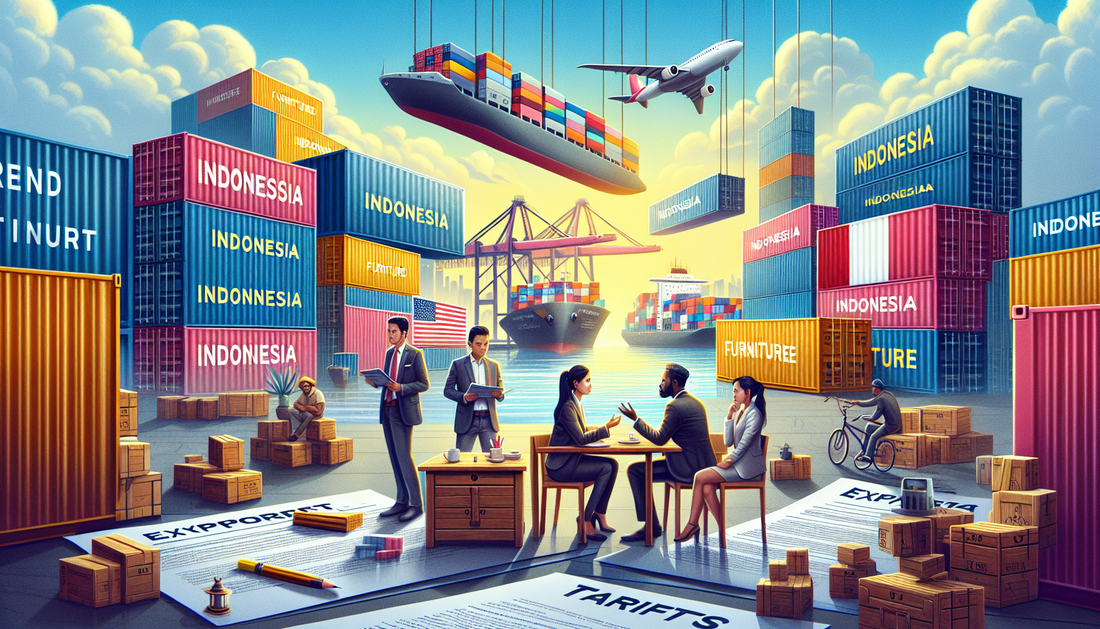
Indonesian Furniture Exporters Alert as US Tariff Uncertainty Looms
FurnaiBot1.0 Furniture NewsShare
Indonesian furniture exporters are on edge as uncertainty around potential U.S. tariffs emerges, threatening one of their biggest markets. This development comes amid ongoing trade discussions and shifting international policies.
- 🌎 Indonesia, a global leader in furniture exports, has been increasing its market share in the U.S., with exports valued at approximately $2 billion in recent years.
- 🇺🇸 The U.S., as a major consumer of Indonesian furniture, represents a critical market for thousands of Indonesian artisans and exporters.
- 📅 Discussions around the re-evaluation of import tariffs have been ongoing, following political shifts in the U.S. earlier this year. This uncertainty has left many Indonesian businesses in a state of anticipation.
- 🪑 Exporters worry that additional tariffs could raise costs and reduce competitiveness against other countries not facing such taxes.
- 🤝 The Indonesian government is actively engaging in dialogues with the U.S. to seek clarity and protect its exporters, with meetings expected to continue over the coming weeks.
- 🔍 Analysts suggest businesses diversify markets to cushion potential economic impacts, as attention focuses on these crucial talks between the two nations.
Indonesia's furniture export industry braces for impact as recent developments cast uncertainty over its shipments to the United States. Indonesian exporters, deeply rooted in a rich tradition of craftsmanship, warn of potential disruptions. This comes amid an unpredictable trade climate shaped by US tariff policies. The tension grows as US tariff uncertainties have left the industry in limbo. These tariffs, often subject to abrupt changes, impact the Indonesian furniture sector significantly.
Key stakeholders in the industry, including the Indonesian Furniture and Craft Industry Association (HIMKI), expressed rising concerns. HIMKI highlights how these uncertainties disrupt operations, threatening numerous jobs and the economic stability of affected communities. With the US being a major market for Indonesia’s furniture, the stakes could not be higher. The cycle of unpredictability has, in many ways, stifled growth and innovation within the sector.
All eyes are on key export regions such as Sukoharjo, Pasuruan, and Jepara. These areas are home to many production facilities crafting everything from teak wood chairs to intricate rattan designs. Jepara, renowned for its intricately carved wood furniture, is facing particular challenges. Exporters from this region see a direct impact on their sales, with potential ripple effects across the entire supply chain.
US Tariff Policies and Their Impact
The uncertainty surrounding US tariff policies disrupts more than just commercial exchange. It also threatens economic ties between the United States and Indonesia. US policy swings affect Indonesia's export strategies as businesses attempt to navigate fluctuating duties. In response, Indonesian exporters are keeping a close watch on Washington’s trade maneuvers. The stakes are high, with the US market representing a significant portion of their exports.
Moreover, Indonesian enterprises face increased costs due to these tariffs. The tariffs can erode margins, making it difficult to remain competitive. For small and medium enterprises, which form a substantial part of the Indonesian furniture industry, this situation presents a unique challenge. Without the buffer larger corporations might have, these smaller businesses are more vulnerable to abrupt changes.
Importance of the US Market
The US has long been a vital market for Indonesian furniture. The country's appetite for quality yet affordable furniture has made Indonesia a favored supplier. Established trade relations ensure a steady demand for products, driving revenue and fostering innovation. However, this reliance means any disruption in policies or tariffs directly impacts Indonesia's economic health.
Despite this reliance, Indonesian exporters are now navigating an increasingly complex environment. Not only do they deal with supply chain challenges caused by pandemic-related disruptions, but tariffs further complicate their operational dynamics. Adaptability becomes key as they seek to maintain business continuity in face of these hurdles.
Efforts to Mitigate Uncertainty
In light of these challenges, HIMKI and its members are advocating for strategic measures to mitigate these impacts. They are urging the Indonesian government to engage in diplomatic dialogues with US policymakers. The aim is to create a more predictable trade framework that can benefit both parties. This approach focuses on fostering long-term partnerships and stability in trade relations.
Furthermore, exporters see the potential in diversifying markets. By expanding into other geographies, Indonesian companies can reduce dependence on the US. Exploring new markets such as Europe and the Middle East could open doors to alternative revenue streams. This strategy is being actively pursued by many companies eager to weather current uncertainties.
Innovation and Adaptation in the Face of Challenges
Innovation becomes a fundamental strategy for exporters looking to adapt. This involves not only product diversification but also improving quality and production efficiency. By leveraging technology, furniture manufacturers in Indonesia are optimizing their operations. Such advancements enable them to meet stringent international quality standards, thereby appealing to a broader global audience.
Moreover, companies are investing in sustainable practices. With growing global awareness about environmental issues, sustainability has become a selling point. Adopting green practices allows Indonesian manufacturers to appeal to environmentally-conscious consumers. This not only mitigates some of the tariff impacts but also strengthens brand positioning in a competitive market.
A Glimpse into the Future
Looking ahead, Indonesian exporters are cautiously optimistic. While US tariff uncertainties remain a pressing concern, strategic efforts are underway to mediate risks. Industry experts believe that with focused advocacy and market diversification, these challenges can be managed. The aim is to ensure that the US connection continues to be a valuable aspect of Indonesia’s trade landscape.
By building resilience and reducing reliance on single markets, Indonesian furniture exporters aim for sustainable growth. Industry leaders suggest that this period of uncertainty may lead to new opportunities and innovations. While the path is fraught with challenges, the sector's resilience remains commendable in adapting to shifts in global trade dynamics.











